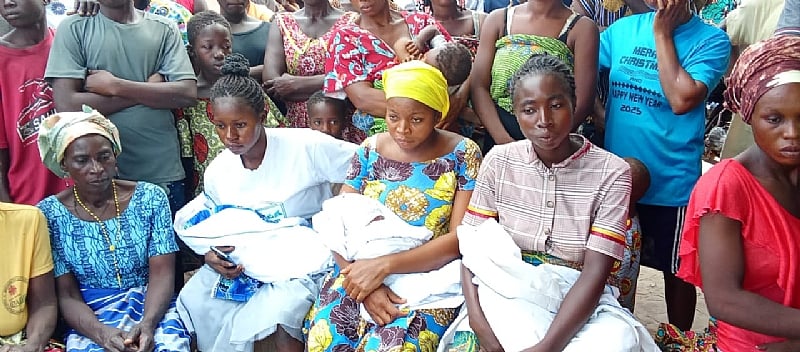The Gbinyiri land conflict, a violent clash erupting in the Salwa-Tuna-Kalba District of Ghana’s Savannah Region on Sunday, August 25, 2025, forced over 2,000 individuals to flee their homes, seeking refuge in the neighboring Bono Region town of Wenchi. Among these internally displaced persons (IDPs), four women have given birth under challenging circumstances, one of them to twins, bringing the total number of newborns to five. The Municipal Coordinator of the National Disaster Management Organisation (NADMO) in Wenchi, Mr. Mohammed Sulemana, confirmed the births and assured the public that both mothers and babies are in stable condition and receiving appropriate medical care. This sliver of positive news amidst the displacement and uncertainty offers a glimmer of hope in a situation fraught with tension and loss.
The swift response of the Wenchi community and NADMO provided crucial support to the influx of displaced persons. Mr. Sulemana’s update indicates that while the initial wave of displacement saw over 2,000 individuals arriving in Wenchi, a significant number – 1,902 out of the 2,041 IDPs – have since returned to their communities in the Salwa-Tuna-Kalba District. This suggests a degree of stability returning to the affected area, allowing for a cautious return. However, the remaining individuals still sheltered in Wenchi highlight the continued need for assistance and the ongoing impact of the conflict.
The land dispute that sparked the violence underscores the deep-rooted complexities and tensions surrounding land ownership in the Savannah Region. Gbinyiri becomes another example in a string of recurring disputes that demand a lasting resolution. The displacement highlights the human cost of these conflicts, with hundreds losing their homes and livelihoods. Families are torn apart, daily routines are disrupted, and the sense of security is shattered. The conflict’s impact extends beyond immediate displacement, generating long-term consequences for social cohesion and economic stability within the region.
Mr. Sulemana’s confirmation that no fatalities occurred amongst the displaced provides a much-needed reassurance. Dispelling rumors of deaths, he emphasized the safety of all individuals affected by the conflict, offering a crucial piece of information in a situation where misinformation can easily spread and exacerbate anxieties. Despite the positive news of safe births and the lack of casualties, the situation remains precarious for those still displaced. While the return of a significant number of IDPs is encouraging, the continued displacement of others emphasizes the ongoing need for support.
The appeal for continued relief efforts underscores the long road to recovery that lies ahead for the affected communities. The immediate needs – food, shelter, medical care – must be addressed, while also considering the long-term consequences of the displacement. Rebuilding homes, restoring livelihoods, and addressing the root causes of the conflict require sustained effort and resources. The call for assistance is not just for immediate necessities, but also for the long-term investment necessary to rebuild lives and prevent future conflicts.
The Gbinyiri land conflict serves as a stark reminder of the fragility of peace in regions grappling with land disputes. While the news of safe births offers a glimmer of hope, the overall situation remains a cause for concern. The ongoing displacement, the need for continued relief support, and the underlying issue of unresolved land disputes highlight the urgent need for sustainable solutions. The successful return of some IDPs offers a measure of progress, but the focus must shift towards addressing the root causes of the conflict to prevent future displacements and ensure lasting peace in the Savannah Region. The task ahead requires a multifaceted approach involving community dialogue, land reform initiatives, and a commitment to addressing the underlying grievances that fuel these recurring conflicts.














